Related Research Articles

Offside is one of the laws in association football, codified in Law 11 of the Laws of the Game. The law states that a player is in an offside position if any of their body parts, except the hands and arms, are in the opponents' half of the pitch, and closer to the opponents' goal line than both the ball and the second-last opponent.
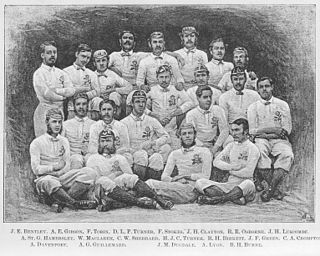
1871 in sports describes the year's events in world sport.

The Calcutta Cup is the trophy awarded to the winner of the rugby match between England and Scotland played annually in the Six Nations Championship. Like the match itself (England–Scotland), the Calcutta Cup is the oldest trophy contested between any two international rugby union teams, pre-dating the Bledisloe Cup by more than half a century. It is also the oldest of several trophies awarded under the umbrella of the Six Nations Championship, which include the Millennium Trophy (England–Ireland), Centenary Quaich (Ireland–Scotland), Giuseppe Garibaldi Trophy (France–Italy), Auld Alliance Trophy (France–Scotland), the Doddie Weir Cup (Scotland–Wales) and the Cuttitta Cup (Italy–Scotland).

The Rugby Football Union (RFU) is the national governing body for rugby union in England. It was founded in 1871, and was the sport's international governing body prior to the formation of what is now known as World Rugby (WR) in 1886. It promotes and runs the sport, organises international matches for the England national team, and educates and trains players and officials.
The Laws of the Game are the codified rules of association football. The laws mention the number of players a team should have, the game length, the size of the field and ball, the type and nature of fouls that referees may penalise, the offside law, and many other laws that define the sport. During a match, it is the task of the referee to interpret and enforce the Laws of the Game.
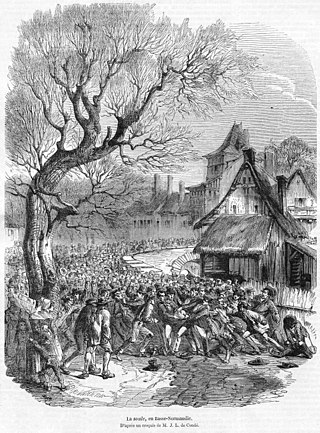
The history of rugby union follows from various football games long before the 19th century, but it was not until the middle of that century that the rules were formulated and codified. The code of football later known as rugby union can be traced to three events: the first set of written rules in 1845, the Blackheath Club's decision to leave the Football Association in 1863 and the formation of the Rugby Football Union in 1871. The code was originally known simply as "rugby football". It was not until a schism in 1895, over the payment of players, which resulted in the formation of the separate code of rugby league, that the name "rugby union" was used to differentiate the original rugby code. For most of its history, rugby was a strictly amateur football code, and the sport's administrators frequently imposed bans and restrictions on players who they viewed as professional. It was not until 1995 that rugby union was declared an "open" game, and thus professionalism was sanctioned by the code's governing body, World Rugby—then known as the International Rugby Football Board (IRFB).
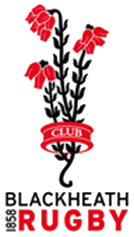
Blackheath Football Club is a rugby union club based in Well Hall, Eltham, in south-east London.
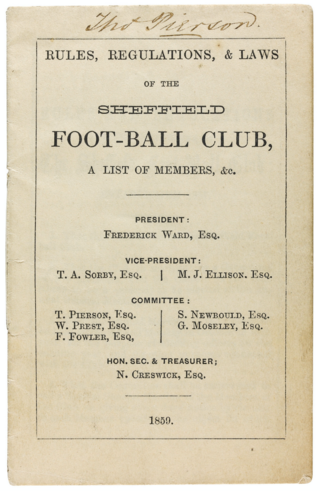
The Sheffield Rules was a code of football devised and played in the English city of Sheffield between 1858 and 1877. The rules were initially created and revised by Sheffield Football Club, with responsibility for the laws passing to the Sheffield Football Association upon that body's creation in 1867. The rules spread beyond the city boundaries to other clubs and associations in the north and midlands of England, making them one of the most popular forms of football during the 1860s and 1870s.
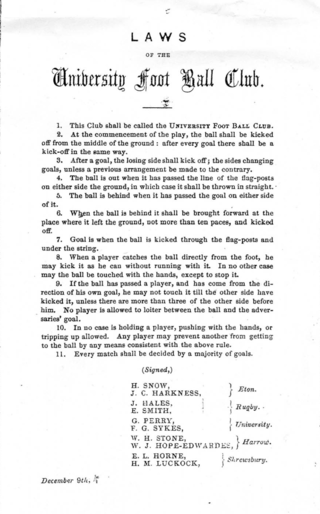
The Cambridge Rules were several formulations of the rules of football made at the University of Cambridge during the nineteenth century.

Rugby union in England is one of the leading professional and recreational team sports. In 1871 the Rugby Football Union, the governing body for rugby union in England, was formed by 21 rugby clubs, and the first international match, which involved England, was played in Scotland. The England national team compete annually in the Six Nations Championship, and are former world champions after winning the 2003 Rugby World Cup. The top domestic men's club competition is Premiership Rugby, and English clubs also compete in international competitions such as the European Rugby Champions Cup. The top domestic women's competition is the Premier 15s.

The history of association football, more commonly known as football or soccer, stretches back to at least medieval times. FIFA cites Cuju in ancient China is the earliest form of a kicking game for which there is scientific evidence, a military manual from the Han dynasty, and it closely resembles modern association football. Similar games were played in ancient Japan, Greece, and Rome. The first written evidence of a football match came in England in about 1170.

The team sports rugby union and rugby league share origins and thus have many similarities. Initially, following an 1895 split in rugby football, rugby union and rugby league differed in administration only. Soon, however, the rules of rugby league were modified, resulting in two distinct forms of rugby.
The sport of association football has a long history in England.
The 1895–96 Northern Rugby Football Union season was the first ever season of semi-professional rugby football, which formed the foundation of the modern-day sport of rugby league. Twenty-two Northern English teams from both sides of the Pennines broke away from the Rugby Football Union to create and compete in their own competition.
The Blackheath Proprietary School was an educational establishment founded in 1830. In the 19th century, it had a profound influence on the game of football, in both Association and Rugby codes. In 1863, the school became one of the founders of The Football Association.
Francis Maule Campbell was a significant figure in the history of association and rugby football.

Football is a family of team sports that involve, to varying degrees, kicking a ball to score a goal. Unqualified, the word football generally means the form of football that is the most popular where the word is used. Sports commonly called football include association football ; Australian rules football; Gaelic football; gridiron football ; International rules football; rugby league football; and rugby union football. These various forms of football share, to varying degrees, common origins and are known as "football codes".
Dangerous play in rugby union is dealt with under the foul play law in the official International Rugby Board (IRB) rugby union law book. It defines foul play as "anything a player does within the playing enclosure that is against the letter and spirit of the Laws of the Game". Under these laws dangerous play includes; punching or striking, stamping or trampling, and kicking.
Forest School F.C. refers to the organised football teams which represent Forest School, Walthamstow. The first XI is the only school team to have played in the F.A. Cup. Former pupils of Forest School play for Old Foresters F.C.
This was the first season of Barnes FC following its foundation in 1862. Since a standard set of laws of football did not yet exist, Barnes drew up its own rules to govern play, choosing to prohibit carrying the ball. Though its rules stated that "the season shall commence on the first Saturday in October", Barnes FC's first game is not recorded until the end of November. In December, Barnes played Blackheath FC, a club which played a rugby-style game that allowed running with the ball and "hacking". The resulting clash of styles forced "mutual concessions" to be made as to the rules for this game. It was nevertheless a lively match, featuring "dangerous mélées" in which club captain Ebenezer Morley narrowly escaped being "garrotted". In the first half of 1863, Barnes played against N.N. Club and Forest FC, two teams who, like Barnes, preferred a dribbling game; both would join Barnes in becoming founder members of the Football Association later that year.
References
- 1 2 Roodt, Gerhard (2015). "6: From the establishment of the RFU up to 1900". The DNA of Rugby Football: A Short History of the Origin of Rugby Football. Partridge Africa. ISBN 978-1482808292.
- 1 2 "The History of the FA". The Football Association. Retrieved 10 December 2015.
- ↑ Dunning, Eric (2004). Sport Histories: Figurational Studies in the Development of Modern Sports. Routledge. p. 56. ISBN 1134447485.
- ↑ "To have or not to hack?". BBC News. 4 June 2004. Retrieved 2016-02-26.
- ↑ Collins, Tony (2009). A Social History of English Rugby Union . Routledge. p. 77. ISBN 978-1134023356.
- 1 2 Dunning, Eric (2005). Barbarians, Gentlemen and Players: A Sociological Study of the Development of Rugby Football. Psychology Press. pp. 94–95. ISBN 071468290X.
- 1 2 Nauright, John. "Rugby". Encyclopædia Britannica. Retrieved 2016-02-26.
- ↑ "Law 10: Foul Play". IRB. Retrieved 2016-02-26.